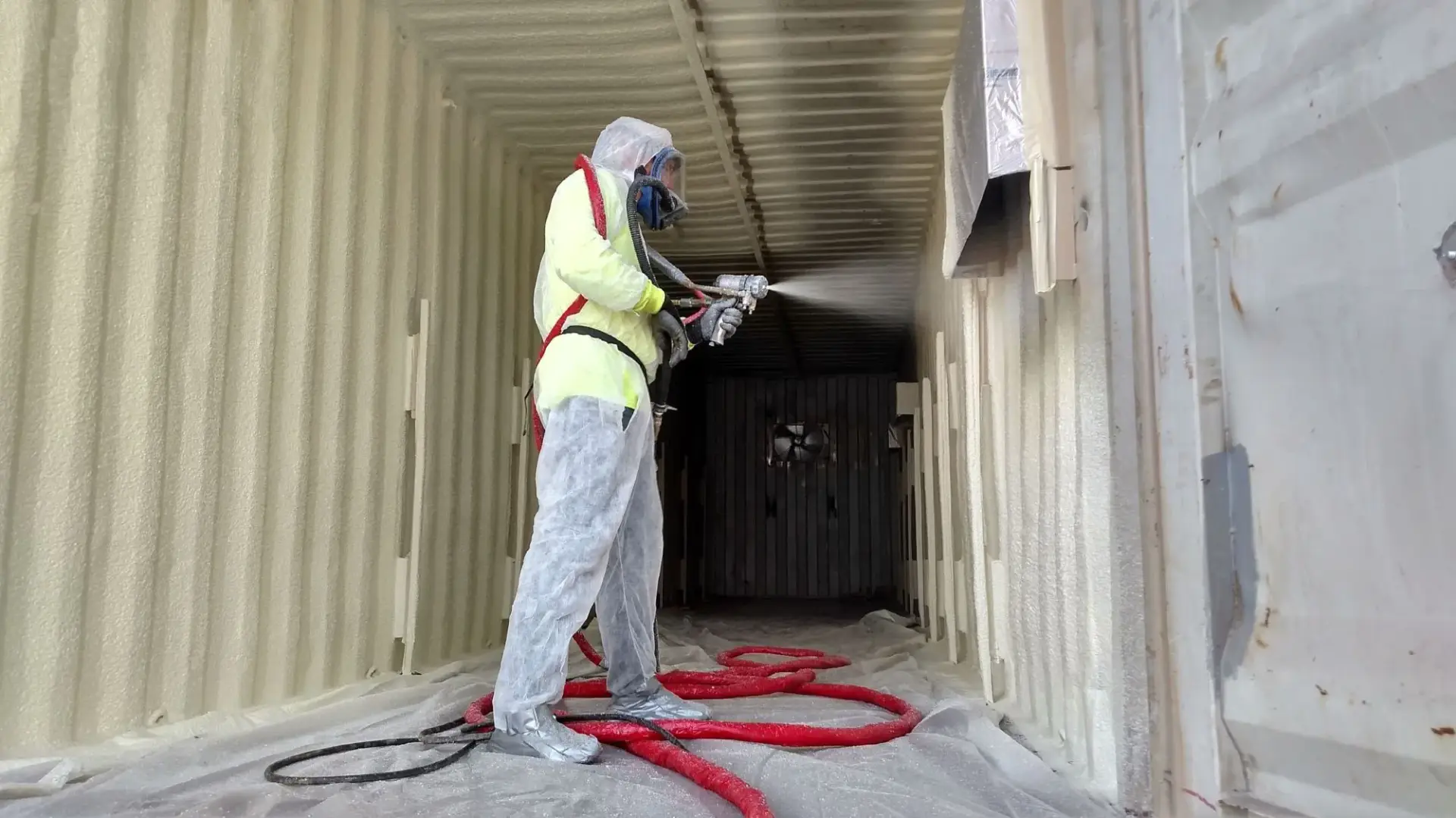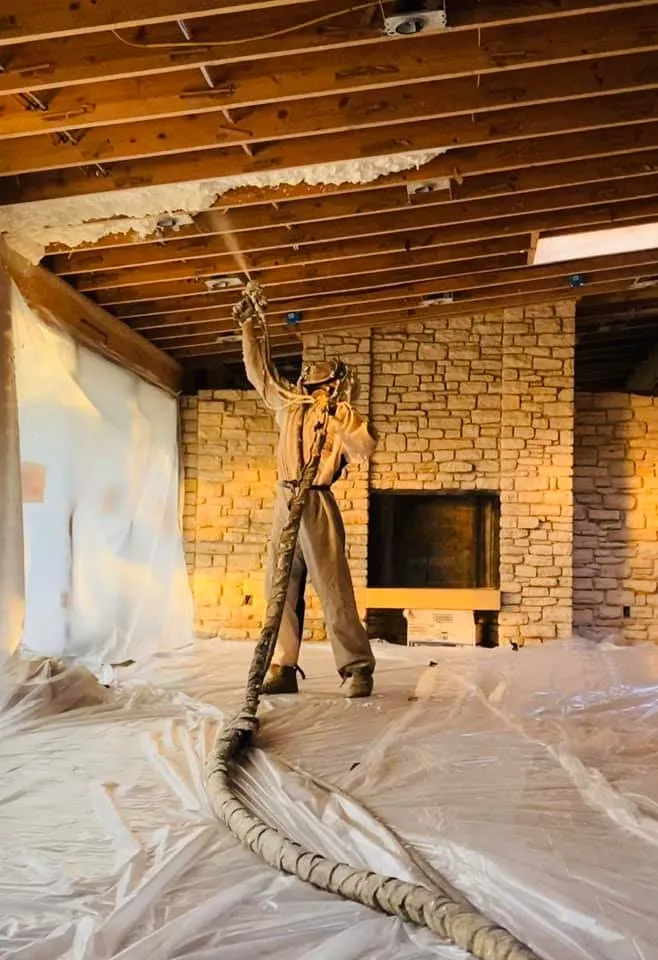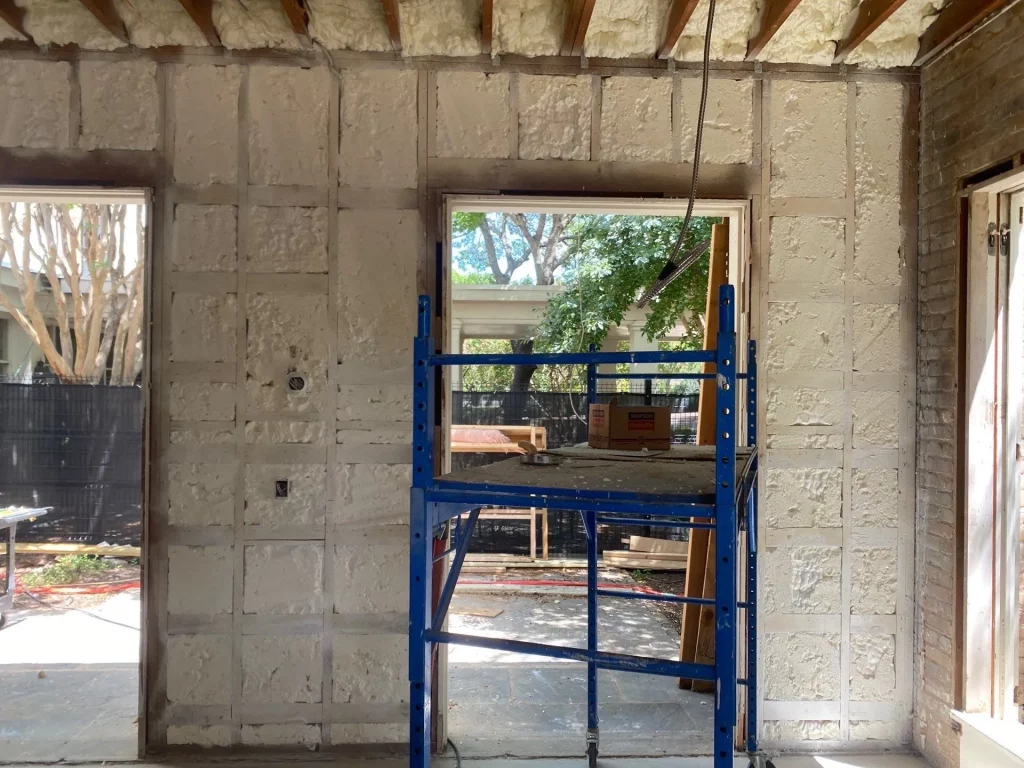R-value measures an insulation material’s ability to resist heat flow. The higher the R-value, the better the material insulates. For commercial buildings, choosing the right insulation can affect energy efficiency, operational costs, and indoor comfort. Spray foam insulation provides one of the highest R-values among insulation options, making it a popular choice for businesses looking to enhance thermal performance.
Types of Spray Foam Insulation and Their R-Values
Open-Cell Spray Foam
Open-cell spray foam is a lighter, more flexible insulation material with a lower R-value than its closed-cell counterpart. It provides effective air sealing while allowing some vapor permeability.
- R-Value: Approximately R-3.5 to R-4.0 per inch
- Best Uses: Interior walls, soundproofing, and applications where moisture management is required
Closed-Cell Spray Foam
Closed-cell spray foam has a denser structure, providing superior thermal resistance and moisture control. It is often used in commercial and industrial settings due to its durability and high insulating power.
- R-Value: Approximately R-6.0 to R-7.5 per inch
- Best Uses: Exterior walls, roofing, and areas exposed to high moisture or extreme temperatures
Comparing Spray Foam to Other Commercial Insulation Materials
When selecting insulation for a commercial space, it’s helpful to compare spray foam with traditional insulation materials.
| Insulation Type | R-Value per Inch | Advantages |
| Fiberglass Batts | R-2.9 to R-3.8 | Cost-effective, widely available |
| Mineral Wool | R-3.0 to R-4.0 | Fire-resistant, good soundproofing |
| Spray Foam (Open-Cell) | R-3.5 to R-4.0 | Air sealing, flexible application |
| Spray Foam (Closed-Cell) | R-6.0 to R-7.5 | High durability, moisture resistance |
| Spray Foam (Closed-Cell) | R-4.5 to R-6.5 | Good for walls and roofing systems |
Closed-cell spray foam stands out with the highest R-value per inch, making it ideal for maximizing insulation in limited spaces.
Factors Affecting the R-Value of Spray Foam Insulation
Thickness of Application
The total R-value of spray foam insulation depends on how thick the material is applied. Commercial installations often require multiple layers to reach the desired thermal resistance.
Aging and Long-Term Performance
Spray foam insulation maintains its effectiveness over time, but some minor reduction in R-value can occur due to settling and environmental exposure.
Installation Quality
Proper application by professionals ensures the foam expands and cures correctly. Poor installation can result in gaps, uneven coverage, and reduced insulation performance.
Energy Efficiency Benefits for Commercial Buildings
Lower Heating and Cooling Costs
Spray foam insulation creates an airtight seal, reducing the workload on HVAC systems. Businesses can see significant energy savings by minimizing heat loss and air leakage.
Moisture and Mold Resistance
Closed-cell spray foam acts as a moisture barrier, preventing water infiltration that can lead to mold growth and structural damage.
Structural Reinforcement
In addition to thermal benefits, closed-cell spray foam adds rigidity to walls and roofs, enhancing the overall stability of a commercial building.
Professional Installation for Maximum Performance
For optimal results, commercial spray foam insulation should be applied by experienced professionals. Stellrr Insulation & Spray Foam provides expert installation services to ensure your building meets energy efficiency standards and maintains long-term insulation performance.
For consultations or project inquiries, contact Stellrr Insulation & Spray Foam at (512) 710-2839 or email info@stellrr.com.
Frequently Asked Questions
How does spray foam insulation compare to traditional fiberglass insulation?
Spray foam provides a higher R-value per inch, better air sealing, and moisture resistance compared to fiberglass batts.
What is the best spray foam insulation for commercial buildings?
Closed-cell spray foam is typically recommended due to its high R-value and durability.
How thick should spray foam insulation be for commercial applications?
Thickness depends on the specific project, but commercial walls and roofs typically require 2 to 4 inches of closed-cell spray foam.
Is spray foam insulation safe?
Yes, when installed properly, spray foam is safe and does not emit harmful chemicals after curing.
Can spray foam insulation be applied to metal buildings?
Yes, closed-cell spray foam is commonly used for insulating metal structures, providing thermal insulation and preventing condensation.
For more information or to schedule an assessment, reach out to Stellrr Insulation & Spray Foam today.





